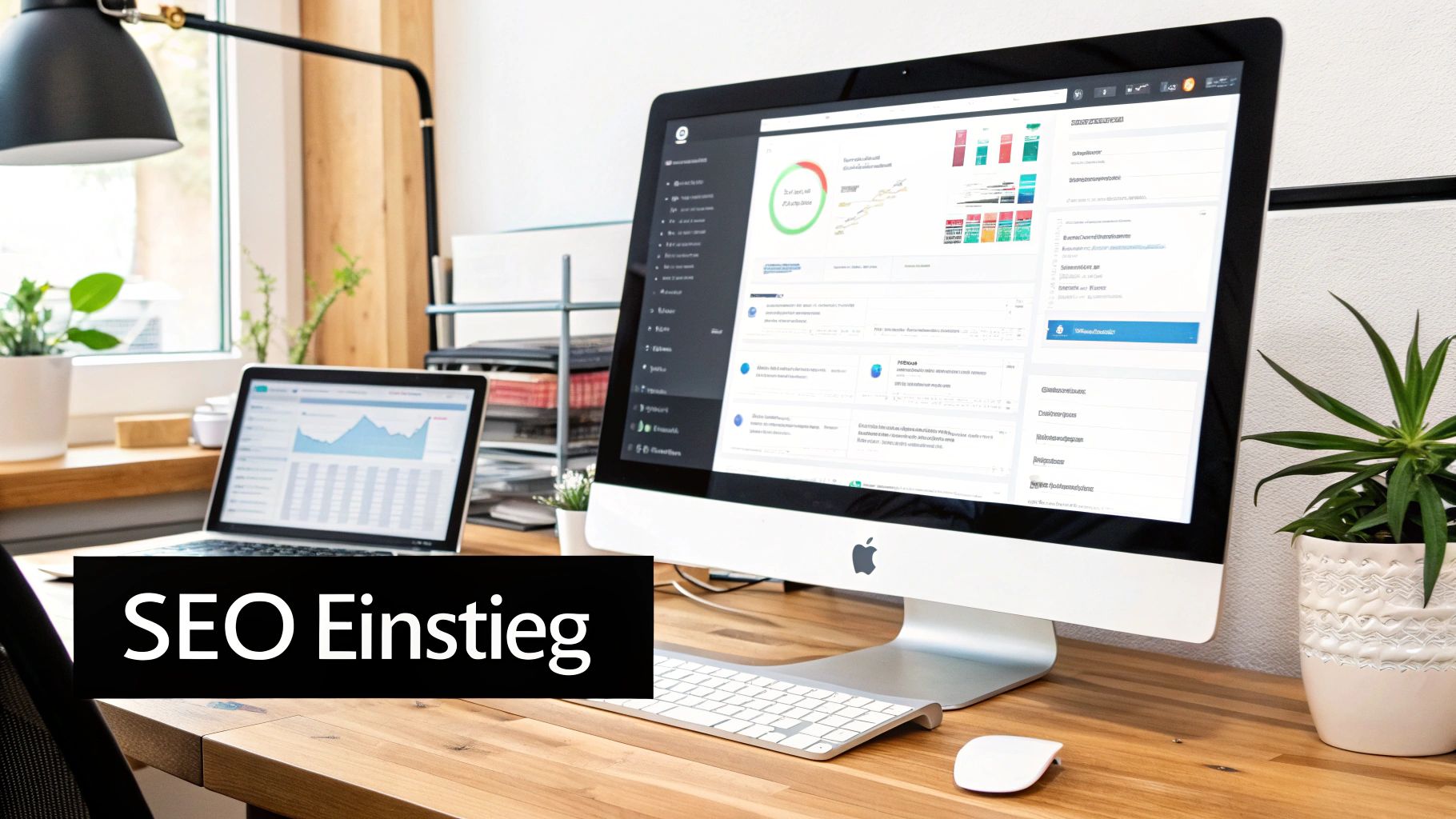Mastering the basics of WordPress SEO optimization

SEO often seems complex and intimidating at first. This section explains the basic aspects of WordPress SEO optimization and demonstrates its value for online success. Search engine optimization is not a mystery; it follows clear rules.
Why is WordPress SEO optimization important?
For most websites, search engines are the most important source of traffic. A good ranking in search results generates more traffic and ultimately leads to greater success. Optimize your WordPress website so that search engines can understand and index your content. This will improve your visibility and reach.
First steps to WordPress SEO optimization
WordPress already provides a solid foundation for SEO. With just a few adjustments, you can fully utilize your website's potential. Here are some key steps:
- Check visibility settings: In the "Settings" under "Reading," make sure that search engines are allowed to index your website.
- Use SEO-friendly URLs: Short, concise URLs with relevant keywords improve user experience and rankings. The "post title" permalink structure is ideal for this.
- Define WWW vs. non-WWW: Choose a variant (www.example.de or example.de) and redirect the other version. Consistency is key here.
These adjustments form the basis for successful WordPress SEO. In addition, you should use suitable plugins and tools to refine your strategy. Continuous analysis and optimization of your content is also important. Even these basic measures can lead to significant improvements. A study by Ahrefs showed that WordPress websites that performed basic SEO optimizations increased their organic traffic by an average of 37% increased. You can find detailed statistics here.
On-page and off-page optimization – two sides of the same coin
Successful website operators view on-page and off-page SEO as a unified whole. On-page optimization focuses on the content and structure of your website (e.g., keyword optimization, meta descriptions). Off-page optimization encompasses measures outside of your website (e.g., link building). For optimal results, both strategies must be coordinated.
With these basics, you'll lay the foundation for successful WordPress SEO and improve your chances of achieving top rankings. In the next section, we'll cover technical SEO, the invisible foundation for sustainable success.
Technical SEO: The invisible foundation of success

After reviewing the basics of WordPress SEO optimization, we'll turn to the technical aspects. These form the invisible yet crucial foundation for your online success. A technically flawless website is a prerequisite for good rankings in search results.
Optimize loading speed
The loading speed of your website is an important factor for the WordPress SEO optimizationA fast loading website improves the User Experience, and that is exactly what search engines like Google Google has repeatedly confirmed that loading speed is a ranking factor. WordPress websites with a loading time below 3 seconds achieve average 70% longer visiting hours and 16% higher conversion rates. Learn more about the importance of loading speed here.
There are several ways to optimize loading speed:
- Caching: Caching plugins store static versions of your website, reducing server load and speeding up loading times.
- Image optimization: Compress your images without compromising quality too much. Also, use modern file formats such as WebP.
- Content Delivery Network (CDN): A CDN delivers your website from servers worldwide, significantly improving loading times for visitors from different regions.
Website structure and URL architecture
A clear and logical website structure is important for both users and search engines. A well-thought-out URL architecture makes it easier for Google to crawl and index your website.
Here are some tips for an optimal structure:
- Hierarchical structure: Organize your content into categories and subcategories. This creates clarity.
- SEO-friendly URLs: Use descriptive URLs that reflect the page content. Avoid cryptic strings.
- Internal linking: Link relevant pages within your website. This improves navigation and search engine friendliness.
To keep an overview of the most important technical SEO factors, you will find a comparison table here:
Technical SEO factors in comparison
Comparison of various technical SEO factors and their influence on ranking
| SEO factor | Influence on ranking | Difficulty level | Recommended tools |
|---|---|---|---|
| Loading speed | High | Medium | Google PageSpeed Insights |
| Mobile-friendliness | High | Medium | Google Mobile-Friendly Test |
| HTTPS | High | Low | – |
| Website structure | Medium | Medium | Screaming Frog |
| URL structure | Medium | Low | – |
| Structured data | Medium | High | Google Structured Data Testing Tool |
| XML sitemap | Low | Low | – |
This table shows that some factors have a greater influence on the ranking than others. The difficulty level indicates how much effort is required to implement each measure.
Structured data and XML sitemaps
Structured data (schema markup) help search engines better understand your website content. For example, they can provide information about products, events, or reviews. XML sitemaps list all the important pages of your website and make it easier for search engines to crawl them. Both measures contribute to WordPress SEO optimization at.
By implementing these technical SEO measures, you lay the foundation for a successful WordPress website.
Content that inspires people and search engines

In the previous section, we looked at the technical aspects of WordPress SEO optimization. Now we turn to content, the heart of every successful website. Good content not only impresses your readers but also search engines. Learn how to achieve both here.
Keyword research and user focus
A thorough Keyword research is the basis for successful content. Find out which search terms your target audience uses to find information about your products or services. Useful tools for this are Semrush or the free WPBeginner Keyword Generator. Keywords alone, however, aren't enough. Focus on your users' needs. What problem does your content solve? What questions does it answer?
What information is your target audience looking for? By answering these questions, you create added value and convince both your readers and search engines.
SEO-friendly headings
Headings structure your text and make it easier to read. They provide search engines with important clues about your page's content. Use your keyword phrase in the H1 heading and in some, but not all, H2 and H3 headings. Formulate your headings so that they accurately describe the content of each section. A clear structure helps both Google and your visitors find their way around quickly. Short, concise headings are particularly effective.
Internal linking for better navigation
The internal linking is an important factor in WordPress SEO optimizationLink relevant pages within your website to improve navigation for your visitors. At the same time, you show Google which pages are particularly important. Strategic internal linking can significantly improve your visibility in search results. You can find more information about sitemaps here. Carefully consider which pages might be additionally relevant to the reader and add appropriate links.
Content audits: Identify and utilize potential
Regular Content audits help you analyze your content performance. Identify successful content and optimize weaker posts. Targeted adjustments, such as updating information or improving readability, can improve existing rankings and attract new visitors. Content length also plays a role. SEMrush analyses show that longer content (1500+ words) on WordPress sites, on average, 3.5 times more traffic, 4 times more shares and 3.9 times receive more backlinks than shorter articles. This underscores the importance of detailed and informative content. With a well-thought-out content strategy and regular optimizations, you lay the foundation for successful WordPress SEO optimization.
The right SEO plugins for noticeable results

Now that we've covered content, let's turn to the tools that support your WordPress SEO optimization: plugins. The selection is vast. This section is all about finding the most effective plugins for measurable results.
Yoast SEO vs. All in One SEO
Two of the most popular SEO plugins are Yoast SEO and All in One SEO (AIOSEO)Both offer extensive features, from keyword analysis to XML sitemap generation. Yoast SEO is often the first choice for beginners. AIOSEO It boasts advanced features and an intuitive user interface. Which option is right for you depends on your individual needs and technical expertise.
To help you decide, here is a comparison table:
WordPress SEO Plugins Comparison: Comparison of the most popular WordPress SEO Plugins by features and suitability
| plug-in | Core functions | User-friendliness | Performance impact | Price | Best for |
|---|---|---|---|---|---|
| Yoast SEO | Keyword analysis, XML sitemaps, readability analysis | Simply | Small amount | Free version, premium version available | Beginners |
| All in One SEO (AIOSEO) | Keyword analysis, XML sitemaps, local SEO | Intuitive | Small amount | Free version, premium version available | Advanced users |
| Rank Math | Keyword analysis, XML sitemaps, schema markup | Medium | Small amount | Free version, premium version available | Users who want many features |
| SEOPress | Keyword analysis, XML sitemaps, content analysis | Advanced | Small amount | Free version, premium version available | SEO professionals |
The table shows the most important differences and similarities between the plugins. Yoast SEO is user-friendly and well suited for beginners. AIOSEO offers more functions and is intuitive to use. Rank Math and SEOPress are powerful alternatives with extensive features.
Other helpful SEO plugins
In addition to the well-known plugins, there are other useful tools. Rank Math combines the functions of Yoast and AIOSEO and offers additional features. SEOPress is a powerful alternative that is especially interesting for experienced SEO professionals.
Performance optimization with plugins
Choosing the right SEO plugin is only the first step. Optimizing loading times is just as important. Caching plugins like WP Super Cache or W3 Total Cache. For image optimization, we recommend plugins such as ShortPixel or Optimole.
Professionally configured SEO plugins can significant improvements in ranking A study by WP Engine with 1,500 WordPress developers showed that websites with professionally configured SEO plugins on average 58% better search engine rankings More information about this study can be found here.
Premium plugins: Is it worth the investment?
Many SEO plugins offer paid premium features. Whether the investment is worthwhile depends on your goals and budget. Analyze your needs and weigh the benefits of the premium features against the costs.
Plugins for different website types
The optimal plugin configuration depends on the type of your website. An online store requires different features than a blog. Make sure your SEO plugin meets your website's specific requirements. AIOSEO offers special product SEO features for WooCommerce stores. With the right SEO plugin and a well-thought-out configuration, you lay the foundation for successful WordPress SEO optimization.
Theme optimization: The overlooked success factor
Your WordPress theme is more than just an attractive visual for your website. It's a fundamental component of your WordPress SEO optimization and significantly influences your ranking. Even paid premium themes can negatively impact your SEO efforts if they aren't optimized for search engines.
Why is theme optimization so important?
A poorly optimized theme often leads to slow loading times, confusing code structures, and display issues on mobile devices. All of these factors negatively impact your Google ranking. Search engines prefer websites that load quickly, are user-friendly, and present relevant content. An optimized theme forms the basis for these important aspects.
The most important theme features for a good ranking
Successful WordPress sites have certain theme characteristics:
Lean code: Clean, clear code without unnecessary elements enables faster loading times and better performance. Avoid themes with superfluous features you don't need.
Responsive design: Your website must display optimally on all devices, whether desktop, tablet, or smartphone. A responsive theme automatically adapts to the respective screen size.
SEO-friendly structure: The theme's structure should be search engine friendly, including clear headings, short URLs, and logical navigation.
A study by Backlinko with 10,000 WordPress websites showed that pages with lean, SEO-optimized themes on average 42% faster loading times and 17% have lower bounce rates. Find detailed statistics here.
Performance optimization of your current theme
You don't necessarily have to change your entire theme to improve your SEO. With targeted adjustments, you can optimize the performance of your existing theme:
Optimize images: Compress your images to reduce file size without losing image quality.
Enable caching: Caching plugins store static versions of your website, reducing loading times for visitors.
Deactivate unnecessary plugins: Too many plugins slow down your website. Disable any plugins you don't absolutely need.
Theme frameworks and page builders
SEO optimization also plays a crucial role when using theme frameworks and page builders. Look for lean frameworks and configure page builders to support your SEO. You might also be interested in how to master category sitemaps. Leading SEO experts rely on a combination of lean code and customized optimizations.
With these tips, you can transform your WordPress theme from a potential SEO obstacle into a real ranking booster and sustainably improve your WordPress SEO optimization.
Local WordPress SEO optimization that really works
For local businesses, visibility in search results in their immediate area is more important than global rankings. This section explains the strategies that make local WordPress SEO optimization effective.
Connecting WordPress and Google Business Profile
Successful local businesses link their WordPress website to their Google Business Profile (GBP). Google Business Profile is your company's business card in local searches and should always be up-to-date. Link both platforms to ensure consistency in your business information and strengthen your local presence. A complete and optimized GBP is essential for a good ranking in local search results, especially in Google Local Pack.
A complete GBP provides potential customers with all the important information at a glance.
- Opening hours
- address
- Telephone number
- Website link
This makes it easier to contact people and increases the likelihood of a visit.
Strategic use of local keywords
Local keywords are the key to local visibility. Integrate location-based keywords naturally into your website content. Instead of just using "bakery," optimize for "Bakery Munich Schwabing," for example. regional terms or District names improve your local reach. However, avoid excessive keyword density. The content should remain natural and reader-friendly.
Generating local backlinks
Backlinks from other local websites are valuable for your local ranking. Cooperate with businesses in your area to mutual links Sponsoring local clubs or events also creates backlinks. Registration in industry-relevant online directories Strengthens your local backlink structure. High-quality backlinks signal to Google your business's relevance for local searches. Check out our guide to local sitemaps.
Structured data for local businesses
Structured data (schema markup) help Google better understand your local business information. Implement LocalBusiness Schemato highlight details like address, opening hours, and phone number for search engines. This increases the chance of being prominently displayed in rich snippets and the local pack. This optimizes WordPress SEO. Structured data allows Google to interpret your website content precisely.
Promotion and management of customer reviews
Positive customer reviews are important for local businesses. Encourage satisfied customers to leave reviews on your GBP and other platforms. Respond to reviews, both positive and negative. This demonstrates commitment and builds trust. Customer reviews not only influence your ranking but also the purchasing decisions of potential customers.
Voice-based local search
The increasing use of voice assistants is changing local search. Optimize your website for voice-based search queries. Formulate your content the way people speak. Answer common questions directly on your website. Local searches via voice assistants often focus on the immediate vicinity and specific needs. For example: "Find an Italian restaurant near me that serves gluten-free pizza."
Data-driven SEO optimization for continuous success
Successful WordPress SEO optimization relies on data and analytics. Intuition alone isn't enough to achieve top search rankings in the long term. In this section, you'll learn how to effectively utilize key analytics tools and optimize your strategy based on data.
Use Google Analytics and Search Console effectively
Google Analytics and the Google Search Console are indispensable tools for every SEO expert. Google Analytics provides valuable data about your website visitors:
- Where do visitors come from? (Traffic sources)
- Which pages are accessed most frequently? (Page views)
- How long do visitors stay on the website? (Dwell time)
- What is the bounce rate?
The Google Search Console shows how Google perceives your website:
- Which keywords lead users to your website? (search queries)
- Which pages are indexed? (Index coverage)
- Are there technical problems? (Crawling errors)
By linking both tools, you get a comprehensive overview of your website’s performance and can WordPress SEO optimization Make sure both tools are correctly connected to your WordPress site.
Keep an eye on important SEO metrics
In addition to the key figures already mentioned, there are other important values that you should monitor:
- Organic traffic: How much traffic do search engines generate for your website?
- Keyword rankings: Where do your keywords rank in the search results?
- Backlinks: How many and which websites link to your site?
- Conversion rate: How many visitors perform the desired action (e.g. purchase, registration)?
These metrics help you measure the success of your SEO strategy and identify optimization opportunities. Regular analyses are the key to long-term success.
Regular SEO audits and reporting
Experienced SEO experts conduct regular SEO audits to review the technical and content optimization of your website. An audit uncovers weak points and provides concrete recommendations for action.
The results of the audit are incorporated into SEO reports that document the current status and progress of SEO measures. These reports serve as the basis for strategic planning and optimization of WordPress SEO.
Identify new ranking opportunities
Competition in online marketing is dynamic. Algorithms and user behavior are constantly changing. To be successful in the long term, you need to identify new ranking opportunities and adapt your strategy.
The analysis of Keyword trends and the observation of competition are important steps to discover new potential. Evaluation of user feedback can provide valuable information.
With data-driven SEO optimization, regular audits, and a flexible strategy, you can continuously position your WordPress website at the top of search results – even in a changing environment.
Are you ready to improve your WordPress SEO optimization? LinkITUp, the SEO agency from Kaiserslautern, supports you with individual solutions and many years of experience.
Article created using Outrank

